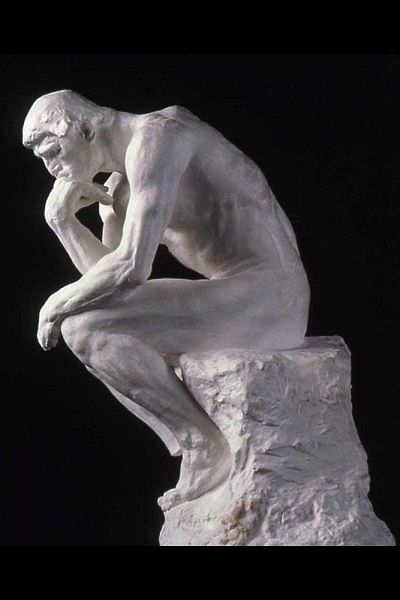Which thinkers will define our future?

Several years ago, it occurred to me that social scientists today are all standing on the shoulders of giants like Niccolo Machiavelli, John Locke, Adam Smith, Alexis de Tocqueville, Max Weber, and Émile Durkheim. One thing they all have in common is that their primary focus was on the social, political, and economic makeup of the Western European world between 1450 and 1900. Which is to say, they provide an intellectual toolkit for looking at, say, the Western world of 1840, but not necessarily the Western world of 2016.
What will be taught in the social theory courses of, say, 2070? What canon – written today or still forthcoming – will those who end their careers in the 2070s wish that they had used when they started them in the late 2010s?
After mulling this question for the past few years, I've narrowed down my choice to the writings of three people: Tocqueville, who wrote in the 1830s and 1840s; John Maynard Keynes, who wrote in the 1920s and 1930s; and Karl Polanyi, who wrote in the 1930s and 1940s.
Keynes's central concerns for his own time ring true today. He was worried about the fragility of our collective prosperity, and the grave tensions between nationalism and the rootless cosmopolitan attitudes underpinning a peaceful and flourishing global society. He focused on how to organise our activities and use our prosperity to create a world fit for the good life. He sought to expose the bankruptcy of ascendant ideological nostrums: laissez-faire, spontaneous order, collective cooperation, central planning. And he thought deeply about the technocratic problems of economic management – and about the social, moral, and political disasters that would follow from failing to address them.
After World War II, the problems that concerned Keynes faded into the background, as renewed prosperity in the West led many to believe that they had been permanently solved. Even during the stagflation (slow growth and rising prices) in the 1970s, the problem was said to be social-democratic overreach, not any fundamental flaw in the political economy of the West.
That argument cleared the way for British Prime Minister Margaret Thatcher and US President Ronald Reagan to scale back the state's economic role and untether market forces. The Thatcher-Reagan connection was an unquestioned success among the moneyed classes that prospered thereafter. It created an ideological consensus that would dominate the public sphere from 1980 to 2010.
Post-war prosperity also overshadowed the central problems with which Polanyi grappled in the 1930s and 1940s. Polanyi accepted that a market society could indeed produce a great deal of material prosperity, but he was concerned that it could only do so by turning people into puppets and playthings of mindless market forces, and that people did not take well to this new role. The goal, for Polanyi, was to achieve the prosperity that a market economy generates, without suffering the risks of poverty, creative destruction, and community erosion implied by the operation of market forces.
Crucially, Polanyi warned that if the modern bourgeois order failed at this task, authoritarian and totalitarian political movements would benefit. During the post-war period, the fair-weather argument that market-driven prosperity justifies any collateral social pain was taken as a given; it also came to define the consensus view among the moneyed class and its ideological backers.
This brings us to Tocqueville, who wrote almost two centuries ago, but whose central concerns never went away. Tocqueville focused on the consequences of the destruction of caste as a principle of social and political order. The big castes – from the supposedly Frankish Nobles of the Sword and Nobles of the Robe to proto-bourgeois merchants and Gallo-Roman villeins – all conferred upon their members small liberties and a measure of personal autonomy in exchange for obligations to the state. (And, of course, the lower one's social status, the greater one's obligations.)
Tocqueville saw this strictly ordered world being replaced by democracy and formal social equality, in which everyone would be equally free, but would also be equally at the mercy of society. In this new setting, no privileges or liberties would protect you if you failed to find a counterparty in the market, or ran afoul of the tyranny of the majority, or simply sought some form of direction as you tried to decide who you were supposed to be.
In Tocqueville's world, the destruction of caste was only partial. He wrote for white men who knew their nationality, knew what caste membership meant, and knew the privileges such membership brought.
In our own time, the destruction of caste and caste privilege is taking another step forward. The period of white males' political dominion in Western democracies is coming to an end. And it is coming to an end at a time when economic populism is replacing technocratic management, often with white males turning to nativism in response to the destruction of their jobs and livelihoods by the impersonal forces of globalisation.
As we can see in one country after another, the old order won't give up without a fight. No old order does. But the caste-like privilege of white males is doomed. The challenge now before us is how best to realise newly available opportunities for human betterment, for the benefit of all. I can think of few more useful guides to that challenge than Keynes, Polanyi, and Tocqueville.
The writer, a former deputy assistant US Treasury secretary, is Professor of Economics at the University of California at Berkeley and a research associate at the National Bureau of Economic Research.
Copyright: Project Syndicate, 2016.
www.project-syndicate.org
(Exclusive to The Daily Star)

 For all latest news, follow The Daily Star's Google News channel.
For all latest news, follow The Daily Star's Google News channel. 



Comments